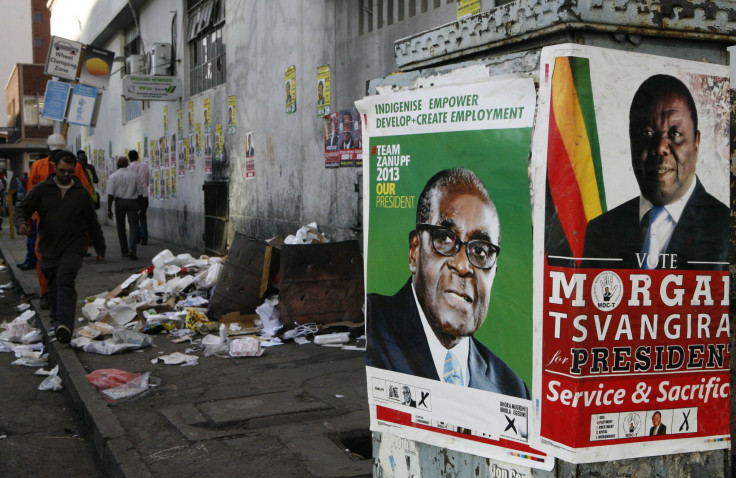In Zimbabwe's Presidential Election, The Opposition Actually Stands A Chance Against Mugabe

Voters in Zimbabwe will cast their ballots in a pivotal presidential election on Wednesday, and tensions are running high. The two main candidates seem equally certain of victory, but international observers have little to offer in the way of predictions.
The ballot will pit two long-time rivals against each other. Incumbent President Robert Mugabe, 89, has ruled Zimbabwe for all of its 33 years of independence. His Zimbabwe African National Union-Patriotic Front, or ZANU-PF, party has gained a reputation for suppressing political opposition. Morgan Tsvangirai, 61, serves as prime minister, and his Movement for Democratic Change, or MDC, is the most formidable contender ZANU-PF has yet faced.
International watchdogs and domestic officials are keeping a close eye on this election lest it erupt into bloody clashes, as happened during the presidential election in 2008. There are also concerns that ZANU-PF could rig the election in its favor, something Tsvangirai insists has already occurred during a deeply flawed registration period that left thousands unable to secure their ballot-box rights. But if these elections progress freely and fairly, who will claim victory once all the ballots are counted?
A War of Reputations
Much of the international community views Mugabe as a despot clinging to power. The president has failed to convert Zimbabwe's considerable mineral wealth -- last year, diamond production alone totaled 8 million carats, worth $865 million -- into development for the country's 13 million people, more than half of whom live in poverty. In this context, outsiders may find it difficult to understand how Mugabe could hope to compete in a legitimate election. But the president does enjoy broad-based support, due in large part to his reputation as a staunch defender of black African nationalism.
Mugabe first rose to prominence as a guerrilla fighter during the 1970s and was instrumental in helping Zimbabwe achieve independence from white rule in 1980. Back then, he was hailed as a hero not only among his compatriots but also by many observers and human rights activists around the world.
The president's international reputation has since soured, due largely to the brutality of his rule and the endemic corruption underlying the regime. Yet, millions of Zimbabweans revere him as a visionary leader. Mugabe makes good use of this reputation, calling regularly for Zimbabwe-based corporations -- especially mining companies -- to be owned by black Zimbabwean nationals. In recent speeches, the president has argued that dispossessed white property owners should receive no compensation.
Tsvangirai has argued against these policies, calling instead for measures to promote growth and foreign investment. Despite his tenure as prime minister, ZANU-PF has managed to retain ultimate control over governance in Zimbabwe. The prime minister was once a ZANU-PF member and Mugabe supporter, but his labor union connections led him to take a stand against the president during the 1990s. He rose to prominence in 2000, when he and the newly-formed MDC led a successful movement to block the passage of constitutional reforms that would've consolidated Mugabe's power.
The two rivals competed head-to-head for the presidency in 2008, and early polls showed Tsvangirai in the lead. But forces loyal to ZANU-PF waged a campaign of violence and intimidation that killed more than 200 people and forced Tsvangirai to drop out. He became prime minister in accordance with a power-sharing agreement brokered by regional governments. Tsvangirai's star has also waned since he ascended to his post, with many formerly ardent supporters disappointed by his failure to bring real change over the past five years.
Like Polling Teeth
Getting an accurate gauge of Zimbabwean's electoral leanings is no easy task in a country where freedom of speech is severely curtailed, and where the politically motivated violence of 2008 is still fresh in voters' minds. Zimbabwe doesn't have reliable formal polls of its own, so analysts have turned to two surveys held by international organizations: Freedom House and AfroBarometer. The AfroBarometer poll asked Zimbabweans in July 2012 whether they would vote for ZANU-PF or MDC, and the results showed that ZANU-PF would win 32 percent of the vote, with MDC garnering 31 percent. Though slightly encouraging for Mugabe fans, those numbers come with a 2 percent margin of error, pointing to a statistical dead heat.
"If any election had been held in July 2012, the outcome would have been too close to call," said the report. "And a second-round run-off presidential election would have been necessary." The Freedom House respondents leaned a bit more heavily in Mugabe's favor when they were polled in June and July of 2012, even suggesting that Tsvangirai's popularity has declined during his time as prime minister. "Of the 53 percent who declared their preference, 20 percent said they would support MDC (down from 38 percent in 2010) and 31 percent ZANU-PF (up from 17 percent in 2010)," according to the survey.
Both polls leave out input from a significant segment of the population that refused to speculate, leaving a giant gap in the data. If the as-yet-undeclared voters lean heavily one way or the other, the upcoming election could result in a landslide. In fact, that's what Tsvangirai and Mugabe both seem to expect -- but each in his own favor.
If the polls are indeed fair, it would seem that no candidate has the clear upper hand. But if Mugabe is able to influence results as he has in the past -- either through violence or more subtle forms of rigging or intimidation -- Tsvangirai could find himself on the losing end once again.
© Copyright IBTimes 2024. All rights reserved.











